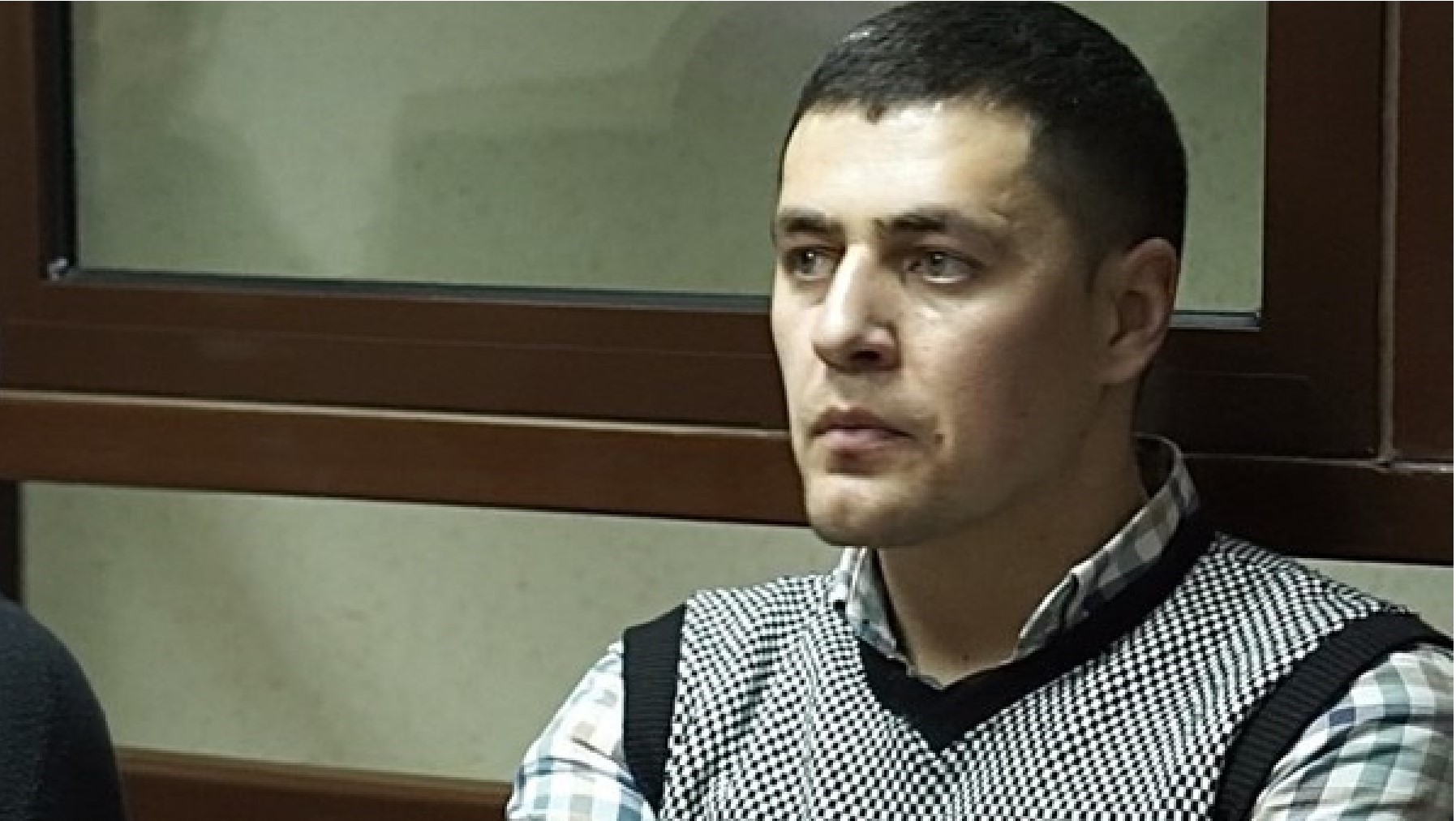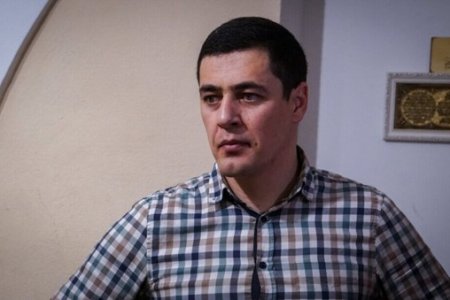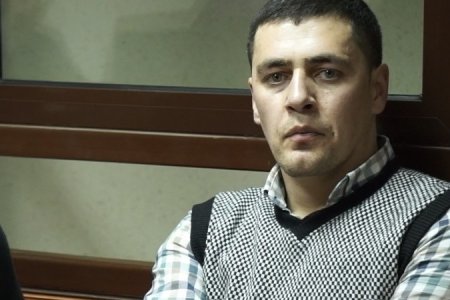
Crimean Tatar civic journalist and political prisoner Amet Suleimanov has been held in one of Russia’s worst prisons without life-saving heart medication for the last three months. It is unclear whether Russia is deliberately seeking to kill a third Ukrainian political prisoner in the space of a year, but they certainly know that they are placing Amet Suleimanov’s life in immediate danger. In late September, a hearing on Suleimanov’s release due to illness was adjourned because all of the relevant documents confirming that Suleimanov should not be imprisoned had been sent to the same Vladimir Prison which is now refusing to pass on the medicine his family has sent. There is no mention of a hearing on his release, although his condition clearly requires this.
As reported, Suleimanov was moved from the SIZO, or remand prison, in occupied Simferopol at the end of August, with his family knowing nothing about his whereabouts until 11 October when he was finally able to contact them. It transpired that he had reached the Vladimir Prison on 27 September and been placed in quarantine.
As soon as the address was confirmed, Amet’s wife, Lilia Liumanova collected medication, syringes, etc. to last two months and sent them to the prison. She has now informed Crimean Solidarity that at the end of November, the parcel was returned. She knows that it reached the prison, and no explanation was given as to why it had not been accepted. She is understandably extremely worried since the medication is vital for keeping Amet’s heart working. Nor are there any grounds for hoping that the political prisoner is receiving any medical care or medicines from the prison medical staff.
Amet Suleimanov, who recently turned 39, suffers from multiple illnesses including, most seriously, chronic rheumatic heart disease, aortic insufficiency and coronary artery disease. He has third level mitral valve prolapse, and urgently needs a heart valve transplant. It was due to his serious health issues that he was forced to curtail the civic journalist work for the Crimean Solidarity human rights movement which were almost certainly the reason why Russia’s FSB targeted him. The Russian occupation ‘authorities’ had stripped Suleimanov of his invalid status in 2015 when he refused to have an operation in Moscow (rather than in Kyiv where he had always been treated). The lack of formal status did not change the facts and even the FSB understood, when they came for him on 11 March 2020, that he would not survive till the ‘trial’ if placed in detention. This was the first time in all of these cases that the FSB themselves asked for house arrest, and it was only on 5 April 2023 that Suleimanov was taken into custody.
This was despite intervention from the UN Committee against Torture which, on 22 February 2023, called upon Russia to abstain from implementing the 12-year prison sentence passed against the civic journalist and recognized political prisoner. It also asked Russia to ensure that Suleimanov received a comprehensive medical examination in a specialized medical facility, as well as heart surgery and/or treatment in accordance with the results of the examination.
It should be stressed that Suleimanov’s imprisonment is also in violation of Russia’s own legislation regarding medical conditions which preclude detention. All of those involved in his arrest, ‘trial’ and imprisonment are, however, aware that he is a political prisoner and are too craven to take autonomous decisions, even those in accordance with the law.
It is also, unfortunately, the case that they are probably certain of their impunity. It is almost a year since another Crimean Tatar political prisoner, Dzhemil Gafarov, died in Russian captivity. He too was gravely ill when arrested, as part of Russia’s worst attack on Crimean Tatar human rights activists and civic journalist in March 2019. He too was ‘convicted’ without any crime and given a horrifically long sentence, although all judges involved understood that this was a death sentence. He died on 10 February 2023, with the prison authorities ignoring clear signs that he was in a critical state.
There is nothing at all to suggest that those most directly implicated in torturing Dzhemil Gafarov to death and also causing the death in captivity of political prisoner Kostiantyn Shyrinh have faced any consequences in Russia or occupied Crimea.
This is why international pressure is critical, including lobbying to ensure sanctions against all of those complicit in politically-motivated death sentences like those against Amet Suleimanov.
As reported, the Russian FSB came for Amet Suleimanov (b. 1984); the two elder sons of a renowned Crimean Tatar historian – Seitumer Seitumerov (1988) and Osman Seitumerov (b. 1992) and their maternal uncle Rustem Seitmemetov (b. 1973) on 11 March 2020.
The arrests and subsequent sentences of up to 17 years’ imprisonment used a deeply flawed and secretive Supreme Court ruling from 2003 to imprison men on ‘terrorism’ charges without even accusing them of a recognizable crime, let alone coming up with convincing evidence. The ruling declared the peaceful pan-Muslim Hizb ut-Tahrir organization, which is legal in Ukraine and not known to have committed acts of terror anywhere in the world, ‘terrorist’. Russia has been using this ruling since 2015 in occupied Crimea as a weapon of repression, especially against Crimean Tatar civic journalists and activists. No proof is even needed of actual involvement in Hizb ut-Tahrir, since the FSB invariably plant ‘prohibited literature’ which they then claim to have found during armed searches which lawyers are pretended from being that. They then send illicit tapes innocuous conversations about religion, Russian persecution, events in Crimea to their own FSB-‘experts’ and use ‘anonymous witnesses’ who invariably repeat the indictment. All of this is seen and clearly understood by the ‘judges’ who prevent the defence from asking questions which demonstrate that such ‘witnesses’ are lying and that the ‘experts’ have no competence to express an opinion.
Seitumer Seitumerov was charged under the more serious Article 205.5 § 1 of Russia’s criminal code with ‘organizing a Hizb ut-Tahrir group’, while his brother, uncle and Suleimanov were charged with ‘involvement’ in this entirely unproven ‘group’, under Article 205.5 § 2. All of the men were also accused of ‘planning a violent uprising’ (Article 278) although even the FSB admitted that not one of them was suspected of actions or direct plans to commit any action aimed at ‘overthrowing the Russian constitutional order’
Despite the flawed charges, non-existent evidence and the fact that any custodial sentence would kill one of the men, prosecutor Igor Nadolinsky demanded horrific sentences against all four men, including 13 years in the case of Suleimanov (whom he had previously tried to get remanded in custody). On 29 October 2021, three ‘judges’ from the Southern District Military Court in Rostov (Russia) - Igor Kostin (presiding judge); Roman Plisko and Yevgeny Zviagin – largely obliged, sentencing Seitumer Seitumerov to 17 years; Osman Seitumerov to 14 years; Rustem Seitmemetov to 13 years and Amet Suleimanov to 12 years. All of these sentences are for the worst of Russian penal institutions, with the first 3.5 years to be spent in a prison, where the conditions are most shocking.
These sentences were upheld on 9 February 2023, by ‘judge’ Aleksandr Aleksandrovich Mordovin from the Military Court of Appeal in Vlasikha (Moscow region).

